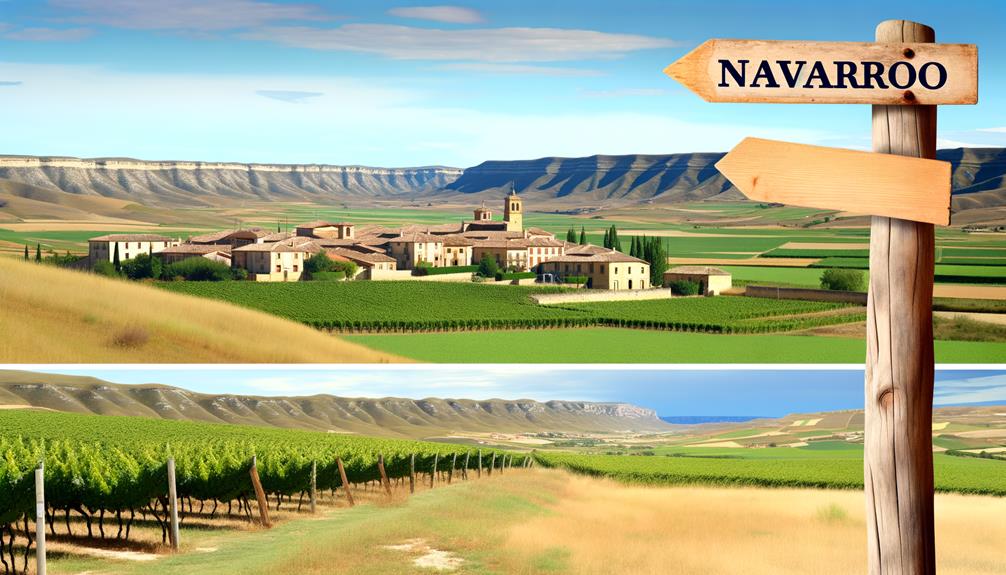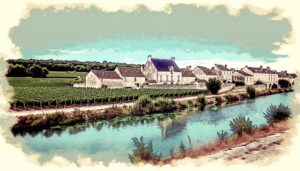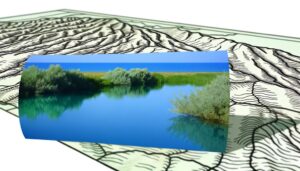Navarro Name Meaning and Origin
The surname Navarro originates from the medieval Kingdom of Navarre, located at the crossroads of Spain and France in the Iberian Peninsula. Influenced by the Basque language and embedded in the historical and cultural shifts of the region, it became prominent during the Middle Ages.
The surname spread globally through economic migration to the United States, Europe, Australia, and Canada in the 19th and 20th centuries. Notable figures carrying the Navarro name, such as politician Mariano Navarro Rubio and musician Dave Navarro, highlight its diverse legacy.
Variations like Navarre and Navarrette exist, reflecting its widespread cultural influence. Discover more about its rich historical tapestry and contemporary significance.

Key Takeaways
- Navarro is rooted in the Iberian Peninsula, particularly linked to the historic Kingdom of Navarre.
- The name reflects cultural and linguistic influences from the Basque language and medieval Spain.
- Economic migrations spread the Navarro surname globally, especially in the United States, Europe, Australia, and Canada.
- Prominent individuals with the Navarro surname have made significant contributions in politics, arts, and sciences.
- Variations like Navarre and Navarrette are common, highlighting the name's adaptation to different regions and languages.
Historical Background
Rooted in the Iberian Peninsula, the surname Navarro traces its origins to the medieval Kingdom of Navarre, a significant political entity in the history of Spain and France.
This region was pivotal during the Middle Ages, serving as a cultural and political crossroads between the Christian and Muslim territories.
The name Navarro itself is derived from the term 'Nafarroa,' referring to the inhabitants of Navarre.
Historical records indicate that individuals bearing this surname often held positions of influence and responsibility, reflecting the strategic importance of Navarre in European geopolitics.
The name's enduring presence in historical documents underscores its significance, providing insight into the sociopolitical landscape of medieval Europe and the enduring legacy of the Kingdom of Navarre.
Geographic Roots
The surname Navarro finds its geographic origins in the historic regions of Spain, particularly in Navarre, a kingdom that played a significant role during the medieval period.
Migration patterns over centuries have influenced the dispersion of the Navarro name, with individuals moving across various parts of Spain and beyond.
This movement reflects broader socio-political changes and the expansion of Spanish influence, thereby embedding the name in diverse cultural contexts.
Historical Spanish Regions
Tracing its origins to the northern territories of Spain, the surname Navarro is intrinsically linked to the historical region of Navarre, an area renowned for its rich cultural and political history. Navarre's significance is underscored by several key aspects:
- Medieval Kingdom: Navarre was an influential medieval kingdom, often embroiled in regional power dynamics involving neighboring Castile and Aragon.
- Cultural Confluence: The region is a melting pot of Basque, Roman, and later, Spanish influences, resulting in a unique cultural tapestry.
- Strategic Geography: Navarre's location at the crossroads of the Pyrenees made it a critical juncture for trade and military campaigns.
These elements collectively highlight Navarre's importance as the geographical and historical cradle of the Navarro surname.
Migration Patterns Influence
Navarro's migration patterns, shaped by socioeconomic factors and historical events, reveal intricate pathways through which the surname has dispersed across various regions and continents. The name has its roots in the Kingdom of Navarre, but over centuries, it spread due to trade, conquest, and colonization. The Spanish Reconquista and subsequent exploration of the New World substantially contributed to the Navarro diaspora. The table below captures the key regions and time periods of Navarro migration:
| Region | Time Period | Key Factors |
|---|---|---|
| Iberian Peninsula | 8th-15th Century | Reconquista, trade |
| Americas | 16th-18th Century | Colonization, exploration |
| Northern Europe | 19th Century | Industrialization, labor |
| Global | 20th Century | Economic opportunities |
This dispersion showcases the adaptability and resilience of the Navarro lineage.
Basque Language Influence
The name Navarro is deeply intertwined with the Basque language, one of the oldest and most enigmatic languages in Europe. This influence is evident not only in the linguistic roots of the name but also in the impact of regional dialects that have shaped its variations.
Historically, the Basque language has played a pivotal role in preserving the cultural and linguistic identity of the Navarra region, providing a rich context for understanding the etymology of the name Navarro.
Basque Linguistic Roots
Influenced by the ancient and unique Basque language, the surname Navarro is deeply rooted in the region's linguistic heritage, reflecting a rich tapestry of historical and cultural evolution. The Basque language, or Euskara, stands out as one of the oldest living languages in Europe, predating the Indo-European languages.
Key elements of the Basque linguistic roots include:
- Etymology: The name Navarro likely derives from 'Nafarroa,' a Basque term referring to the Kingdom of Navarre.
- Phonetics: The preservation of specific phonetic characteristics unique to Euskara, such as the use of 'v' and 'r' sounds.
- Syntax: The structural influence of Euskara on the formation and usage of surnames, emphasizing the importance of geographic and familial ties.
Regional Dialect Impact
Drawing from its deep Basque linguistic roots, the surname Navarro also reflects the diverse regional dialects within the Basque language, each contributing subtle variations in pronunciation and meaning.
Historically, the Basque region is characterized by its linguistic fragmentation, with dialects such as Gipuzkoan, Bizkaian, and Upper Navarrese influencing local nomenclature. These dialectal nuances often manifest in the phonetic and orthographic forms of surnames.
For instance, variations like 'Nabarro' or 'Navarre' may emerge, indicative of specific regional influences. Such distinctions are crucial in understanding the etymology of Navarro, as they reveal the interplay between language and geography.
The regional dialect impact underscores the rich tapestry of linguistic evolution inherent in Basque surnames, providing a deeper comprehension of their origins.
Evolution Over Centuries
Over the centuries, the surname Navarro has undergone significant transformations, reflecting broader historical, cultural, and linguistic shifts within the regions it has been prevalent. Initially rooted in the Kingdom of Navarre, its evolution can be traced through several key phases:
- Medieval Period: During this time, the spread of the surname was closely tied to the Reconquista, as Navarrese families migrated southward, influencing local dialects and social structures.
- Renaissance Era: The resurgence of classical learning and exploration led to the dissemination of the Navarro name beyond Iberian borders, particularly to the Americas.
- Modern Era: Globalization and diasporas have further diversified the surname's presence, leading to its adaptation in various linguistic and cultural contexts worldwide.
This evolution underscores the dynamic nature of surnames amidst historical currents.
Cultural Significance
The surname Navarro, having traversed significant historical pathways, embodies a rich tapestry of cultural significance that extends beyond its geographic and temporal origins.
Historically linked to the Kingdom of Navarre, the name symbolizes a nexus of cultural interchange between the Iberian Peninsula and broader Europe. It evokes the resilience and identity of the Navarrese people, who navigated periods of political upheaval and cultural fusion.
The name carries connotations of noble lineage and regional pride, often associated with the chivalric traditions of medieval Spain. Additionally, Navarro has permeated literature, music, and art, reflecting its enduring influence.
This surname encapsulates not just a familial lineage, but a broader narrative of historical and cultural endurance, highlighting its esteemed place in societal heritage.
Spread Across the Globe
Throughout history, the Navarro surname has frequently migrated across continents, illustrating a dynamic pattern of diaspora and cultural integration. Originating from the historic region of Navarre in Spain, the name has traveled and taken root in various parts of the world.
Key phases in its global spread include:
- Colonial Expansion: During the Spanish colonization of the Americas, many Navarros settled in Latin American countries, including Mexico, Argentina, and Colombia.
- Economic Migration: The 19th and early 20th centuries saw Navarros moving to the United States and Europe in search of better opportunities.
- Modern Globalization: The late 20th and early 21st centuries have further dispersed the name, with notable populations in countries like Australia and Canada.
This widespread distribution reflects both historical movements and contemporary trends.
Notable Figures
Among the many individuals who have borne the Navarro surname, several have achieved significant recognition in fields such as politics, arts, and sciences, leaving an indelible mark on history.
In politics, Mariano Navarro Rubio served as Spain's Minister of Finance during Franco's regime, implementing critical economic reforms.
In the arts, the renowned American guitarist Dave Navarro gained fame as a member of the rock band Jane's Addiction and the Red Hot Chili Peppers.
In the sciences, Vicente Navarro, a public health scholar, has been influential in social medicine and health policy.
Each of these figures exemplifies the diverse contributions of those with the Navarro surname, showcasing their impact on various facets of society and culture.
Variations and Derivatives
Tracing its linguistic evolution, the surname Navarro exhibits numerous variations and derivatives that reflect its rich historical and geographical journey through different regions and cultures. These adaptations showcase the surname’s ability to integrate into diverse linguistic landscapes while maintaining its core identity. The Navarro surname can be traced back to the ancient Basque region in Spain, and its use has spread to various countries across the world. Its significance as an archibald name highlights its enduring presence and influence in different cultures and societies. Despite its various adaptations and derivatives, the Navarro surname continues to carry a sense of tradition and heritage.
Notable variations and derivatives include:
- Navarre: This English and French variant highlights the influence of the Navarre region in France and Spain.
- Navarrus: A Latinized form used in ecclesiastical and scholarly contexts during the medieval period.
- Navarrette: A diminutive form found in Spanish-speaking countries, indicating a smaller or more specific lineage.
These variants underscore the surname's adaptability and enduring presence across different eras and regions, illustrating the widespread influence of the Navarro name.
Modern-Day Usage
In contemporary society, the surname Navarro persists as a common identifier, particularly in Spanish-speaking countries and regions with historical ties to Iberian culture. Its prevalence can be attributed to the widespread migration patterns from Spain during the colonial period, embedding the name in various Latin American countries.
Modern-day usage also sees Navarro represented in diverse professional fields, from politics to entertainment, exemplifying its integration into various cultural contexts. Additionally, the name has been adapted to local dialects and languages, further reinforcing its ubiquity.
Analyzing public data, one observes that Navarro is not only a marker of heritage but also a symbol of the enduring legacy of Spanish influence, resonating through generations and across continents.
Conclusion
The name Navarro has deep historical roots in the Navarra region and significant Basque linguistic influence. It has evolved over centuries, spreading its cultural significance worldwide. Its journey from a geographical identifier to a distinguished surname is akin to the metamorphosis of a caterpillar into a butterfly, illustrating its dynamic nature. The Navarro name also carries with it a sense of tradition and pride, as it is often passed down through generations, symbolizing a connection to the rich history of the Navarra region. The meaning of Lucas name, on the other hand, is rooted in Latin and signifies “light” or “illumination,” reflecting qualities of wisdom and enlightenment. This blending of historical significance and timeless symbolism further underscores the dynamic nature of the Navarro surname.
Recognized globally, the name has maintained its essence while adapting to various cultures, leaving an indelible mark on history and modern societies alike.






